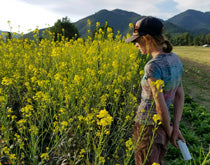Applegate Artichoke SOLD OUT
HOW TO GROW GARLIC, SOFTNECK
Garlic thrives in well-drained, rich soil. Work a 1 inch layer of compost into beds before planting. Divide garlic bulbs into cloves just before planting, and keep as much garlic skin on as possible. Do not peel. Plant cloves at 6” apart, 2-3” deep. Make sure to plant the garlic clove with the tip facing upwards towards the sky, and the root downwards into the ground. Mulch with several inches of straw.Plant 6-8 weeks before the ground freezes in Northern regions, or plant as late as March in regions without a freeze. In colder regions, apply another inch or two of compost in the spring to boost the garlic’s growth. As harvest time approaches (begin checking in the late June), reduce or stop watering to prevent mold on the bulb. Harvest the bulbs when the top 4-5 leaves are slightly green and the lower leaves are dry. Each leaf represents one layer of skin over the bulb. Dry and cure the bulbs in a dry, cool, shaded location for 3-4 weeks, and then cut the foliage and root hairs from the bulbs. Store in a cool, dry place.Try braiding softneck garlic by keeping the leaves on the plant! Add fresh culinary herbs such as sage and rosemary, as well as flowers such as statise, and strawflowers into the braids, and they will dry beautifully. Soil pH 6-7.
Planting Depth 2-3”
Plant Spacing 2-3”
Row Spacing 6”
Days To Maturity 8”
Full Sun,
Planting Depth 2-3”
Plant Spacing 2-3”
Row Spacing 6”
Days To Maturity 8”
Full Sun,
- Default Title$12.00
This artichoke garlic is a local selection from Southern Oregon between a few different artichoke garlic varieties. It is heat tolerant, as it outperformed all other varieties during a sudden intense heat spike in the beginning of the summer. It stores through the winter for 6-9 months, and its mild flavor increases...
This artichoke garlic is a local selection from Southern Oregon between a few different artichoke garlic varieties. It is heat tolerant, as it outperformed all other varieties during a sudden intense heat spike in the beginning of the summer. It stores through the winter for 6-9 months, and its mild flavor increases with storage. It has beautiful purple skins and an average 12-14 large cloves per bulb. Tags: Harvest: Mid, Season: Fall, Winter, Spring, Summer.
Garlic has been cultivated for at least 5000 years. It is native to Central Asia and Northeastern Iran, but was carried to most parts of the world as a pungent herb and medicine, where it was cultivated into many distinct and subtle varieties. The word “garlic” comes from the Old English word “garleac”, which means “spear leek”.
Garlic has been cultivated for at least 5000 years. It is native to Central Asia and Northeastern Iran, but was carried to most parts of the world as a pungent herb and medicine, where it was cultivated into many distinct and subtle varieties. The word “garlic” comes from the Old English word “garleac”, which means “spear leek”.
Learn More
Meet Your Farmer
We promote fair trade, organic practices and environmental responsibility throughout the Restoration Seeds supply chain. Below are the family farmers and seed suppliers who bring our open pollinated seeds to you.
Feral Farm
Certified Organic by CCOF
Seed grower since 2015


I started growing seed commercially as an apprentice at the Organic Farm School in the Puget Sound in Washington. I already loved growing vegetables, but taking a plant all the way through its life cycle felt like a special kind of honor, and I quickly saw the value in sustaining organic, important, and rare plant varieties and participating in sustainable food systems in this way. I moved to Oregon in 2015 and have been growing my organic seed farming business over the last four seasons by renting land from existing farms and slowly taking on higher volumes and more varieties. I’m currently growing 1.6 acres of certified organic seed crops and heirloom garlic.
Reviews

